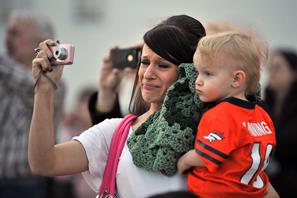
Amanda Palmer and her son Brayden watch as her husband, Staff Sgt. Michael Palmer, takes off for a deployment at Buckley Air Force Base, Colo. (Colorado Air National Guard photo by Tech. Sgt. Wolfram M. Stumpf)
Below is a blog post from the Navy Operational Stress Control’s “Navigating Stress” blog, written by Elizabeth Winters, a Navy wife and stay-at-home mom of three.
The holidays are fast approaching, and even when not dealing with the heightened emotions and stress of a deployment, holidays are rarely what we think of as “stress-free.” Add in the pressure to keep the holidays special while your loved one is absent, and you can very easily become overwhelmed. It’s vital to take active measures to avoid overworking yourself. For me, it comes down to three things: priorities, traditions and efficiency.
Before the holiday season is in full swing, sit down and decide what’s important to you and your family. Don’t feel badly about declining invitations. Friends and family will understand if you need to pare down social obligations. Eliminate gatherings that only add stress to your schedule and choose your priorities. Let go of everything else.